|
|
|
Sort Order |
|
|
|
Items / Page
|
|
|
|
|
|
|
| Srl | Item |
| 1 |
ID:
187552
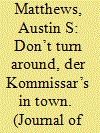

|
|
|
|
|
| Summary/Abstract |
How do dictators coup-proof their armed forces from within the barracks? Coup-proofing is an important aspect of autocratic survival, but execution can be challenging due to the secrecy of plots and the vast size of the armed forces. Counterbalanced state security forces are more effective at resisting coups, but less effective at noticing signs of plots before they can be launched. If dictators wish to prevent coup attempts from occurring in the first place, they may decide to recruit and commission cadres of loyalists directly into the armed forces as political officers, tasked with monitoring for and reporting signs of disloyalty within the ranks. This article explores the development and use of these political officers within dictatorships, arguing that they are especially effective at preventing coup attempts. It also makes the case that their institutional design, while effective at detecting coup plots, makes them less useful at resisting coups that have reached the execution phase. I test these arguments on a cross-national sample of dictatorships from 1950 to 2010, finding strong evidence that political officers are incredibly effective coup detectors, but not coup resisters. These findings have important implications, particularly as several resilient modern dictatorships continue to rule with well-developed political officer systems.
|
|
|
|
|
|
|
|
|
|
|
|
|
|
|
|
| 2 |
ID:
187555
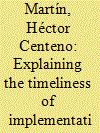

|
|
|
|
|
| Summary/Abstract |
Truth commissions are widely seen as important peacebuilding tools partially because they issue recommendations that seek to prompt further justice initiatives to address past abuses and promote institutional reforms that encourage non-repetition. Yet, despite growing interest in truth commissions among academics, policymakers, and activists, little attention has been paid to the recommendations that they outline in their final reports. In this article, we examine the factors that shape whether and when truth commission recommendations are enacted. Thus, we seek to explain not only whether recommendations are implemented, but also how quickly they are implemented. We use survival analysis to test the effects of a range of political and economic country-level variables, commission-specific qualities, and recommendation characteristics on the implementation record of nearly 700 recommendations formulated by ten Latin American truth commissions that operated between 1984 and 2014. The analysis yields interesting results, including that implementation proceeds more quickly in wealthier countries and when recommendations are issued by commissions created immediately after transitions, when the transitions occurred in which one side was victorious, and when commissions are created by an executive order. Moreover, recommendations that are directed towards the past are implemented more slowly than future-oriented measures.
|
|
|
|
|
|
|
|
|
|
|
|
|
|
|
|
| 3 |
ID:
187558
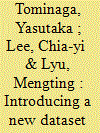

|
|
|
|
|
| Summary/Abstract |
This article introduces a new dataset, Designated Terrorist Organizations (DTO), which details every terrorist organization designated or sanctioned by two IGOs and 148 state governments, as well as the timing of each designation. The DTO includes 281 terrorist groups that have been officially designated by at least one IGO or state government as well as 223 other active terrorist groups that have never been designated. The DTO has a dyadic structure that offers information on both the designating country and the designated group, such as the base location and past activities. We present some trends and patterns of terrorist designation over time and across countries and apply the DTO to analyze the impact of terrorist designation on groups’ attacks. Our preliminary findings show that terrorist designation is negatively associated with terrorist attacks, although the effect only appears in an earlier period.
|
|
|
|
|
|
|
|
|
|
|
|
|
|
|
|
| 4 |
ID:
187559
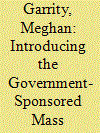

|
|
|
|
|
| Summary/Abstract |
This article introduces the Government-Sponsored Mass Expulsion (GSME) dataset documenting cross-border mass expulsion episodes around the world from 1900 to 2020. This new dataset focuses on mass expulsion policies in which governments systematically remove ethnic, racial, religious or national groups, en masse. The GSME dataset disaggregates mass expulsion from other exclusionary politics concepts to isolate policies of intentional group-based population removal. This allows for a systematic examination of governmental expulsion policies, distinct from policies aimed at annihilation (genocide), control (massacre) or cultural elimination (coercive assimilation). The GSME dataset documents 139 expulsion episodes since 1900, affecting over 30 million citizens and non-citizens across all world regions. The data are drawn from archival research conducted at the United Nations High Commissioner for Refugees and the International Committee of the Red Cross, as well as secondary sources and extant datasets. This article presents an empirical overview of the data including information on the expelling country, onset, duration, region, scale, category of persons expelled, and frequency. Although mass expulsion is a rare event, it is a reoccurring rare event. Its consistent use – with over two million people expelled in the last five years alone – demands additional empirical and theoretical investigation. The GSME dataset contributes to the study of exclusionary politics as a dependent variable, but it also offers promise as an explanatory variable for those studying phenomena affected by mass expulsion.
|
|
|
|
|
|
|
|
|
|
|
|
|
|
|
|
| 5 |
ID:
187554
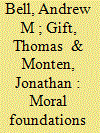

|
|
|
|
|
| Summary/Abstract |
How does partisan identification shape the attitudes of US military officers toward the protection of civilians in war? Drawing on unique cross-cohort surveys of soon-to-be commissioned officers in 12 Army Reserve Officers’ Training Corps (ROTC) training battalions, we find that Democratic-leaning cadets generally prioritize norms of civilian protection more than Republican-leaning cadets when confronted with competing values of military advantage and force protection as part of a ‘combatant’s trilemma’. This gap remains partially resilient after sustained exposure to military training and socialization, including in the norms of restraint embodied by principles of combat ethics and the law of war. We attribute these partisan differences to insights from Moral Foundations Theory (MFT), which suggests that the moral values of Democrats and Republicans guide their views toward the individual use of force in combat. Our findings have important implications for comprehending the impact of political ideology and military training and socialization on attitudes regarding restraint toward civilians in war. Given the widely recognized conservative composition of the US military’s membership, these findings may help to further inform understanding of US military operations and the underlying causes of US adherence to – or violation of – the laws of armed conflict.
|
|
|
|
|
|
|
|
|
|
|
|
|
|
|
|
| 6 |
ID:
187551
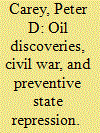

|
|
|
|
|
| Summary/Abstract |
Anticipated shifts in power favoring one side can lead to preventive war today. When power is poised to shift towards the state, potential rebels may launch a civil war while they retain a relative advantage, consistent with the commitment problem. We argue that a government expecting a group to rebel has an incentive to prevent that challenge by repressing the population. Repression is a government attempt to undermine and prevent dissent that would turn into rebellion—dissent and rebellion that is more likely in expectation of power shifting in the government’s favor. Empirical models using data on newly proved oil reserves show that states expecting an increase in oil wealth demonstrably increase repression in the years between discovery and access. The findings imply a new connection between natural resources and political violence: Oil wealth can encourage repression not only by reducing its costs, but also by creating windows of opportunity that rebels hope to exploit and governments hope to close. Not only civil war but also rising expectations of rebellion are associated with a marked increase in state-directed violence against civilians.
|
|
|
|
|
|
|
|
|
|
|
|
|
|
|
|
| 7 |
ID:
187553


|
|
|
|
|
| Summary/Abstract |
Do women leaders enact more hawkish foreign policies? Some research argues women leaders are more likely to adopt aggressive and masculine characteristics to obtain national office. As a result, women leaders should exhibit more hawkish behavior than men. In this study we re-examine the relationship between the women leaders and foreign policy by focusing on military spending behavior. We argue that conventional empirical methods, such as linear regression, are ill-suited to examine data on women leaders and military spending. These methods are sensitive to outliers and small sample sizes: two characteristics of women leadership. To address these issues, we use the synthetic control method to estimate the military spending behavior of women leaders. By creating unique synthetic counterfactuals for three prominent women leaders – Thatcher, Gandhi, and Meir – we analyze what would have happened if a particular state had a male leader. Generalizing beyond these cases, we also conduct a multiple treatment test that examines the effect of women leadership jointly across multiple countries and time periods. We find that women leaders do not spend more on the military than men. We analyze plausible explanations of these null results and discuss their implications.
|
|
|
|
|
|
|
|
|
|
|
|
|
|
|
|
| 8 |
ID:
187557
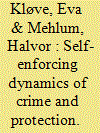

|
|
|
|
|
| Summary/Abstract |
This article presents a model describing a symbiotic relationship between criminals and a partnership of protection providers, called the Firm. The partners of the Firm earn profits as they have market power in the supply of protection. The Firm recruits its new partners among criminals. As a result, the prospect of graduating to the Firm adds an incentive for violent crime. The result is a violence multiplier where more violence increases the profits to the partners of the Firm, in turn contributing to the incentive for violence. The violence multiplier also generates an incentive for the protection providers to welcome new partners, even though new partners dilute the profits. The model combines elements from contest theory and rent-seeking theory but, nevertheless, generates results that are in contrast to standard results from the rent-seeking literature. For example, due to the interdependence between protection providers and criminals, a decrease in the cost of violence increases violence more than pari passu and increases the value of being a criminal. Also, tougher competition between criminals may benefit all of them. The empirical relevance of key elements of this framework are confirmed by exploring unique data on incarcerated youth in South Africa. The empirical results confirm a hierarchical gang structure and indicate that this structure does indeed promote violence.
|
|
|
|
|
|
|
|
|
|
|
|
|
|
|
|
| 9 |
ID:
187550
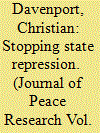

|
|
|
|
|
| Summary/Abstract |
While research into why repression/human rights violation goes up or down has thrived over the past 50 years, essentially no effort has been made to examine what stops this behavior once under way – especially activity that is large-scale as well as violent. To address this topic, we put forward the idea of a repressive spell (similar to that in the study of war, civil war, and terrorism) and a new theoretical framework that conceptualizes repression as a sticky process that is unlikely to terminate unless it is disturbed in some manner. Such an orientation is important because it leads us to conclude that disturbance is more likely to happen under situations of democratization compared to any of the factors typically highlighted in the literature and relevant policy community. Investigating a new database regarding 239 large-scale repression spells from 1976 to 2006, we find that democratization is associated with spell-termination and there is little systematic pacifying influence from anything else. Additionally, we find that nonviolent movements for change principally drive democratization but that these movements have little direct impact on state repression spells in and of themselves.
|
|
|
|
|
|
|
|
|
|
|
|
|
|
|
|
| 10 |
ID:
187556


|
|
|
|
|
| Summary/Abstract |
Mistrust is a common cause of conflict between individuals belonging to different identity groups. When can such mistrust be overcome? We present a theoretical model of trust-building across social identity groups to address this question. Trust between groups increases when individuals in one group are willing to take a chance on engaging with members of the other group, their engagement is positively reciprocated, and they are able to credibly communicate the experience to their fellow group members, thereby increasing their belief that members of the other group are trustworthy. This process is made easier if the individuals are not too hostile to the out-group, are flexible enough to change their beliefs in response to new information, and are sufficiently attached to their own group to be honest about their experiences with out-group members.
|
|
|
|
|
|
|
|
|
|
|
|
|
|
|
|
|
|
|
|
|